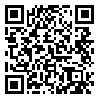BibTeX | RIS | EndNote | Medlars | ProCite | Reference Manager | RefWorks
Send citation to:
URL: http://jams.arakmu.ac.ir/article-1-3997-en.html

 , Mohsen Shamsi2
, Mohsen Shamsi2 
 , Mahboobeh Khorsandi3
, Mahboobeh Khorsandi3 
 , Mohammadreza Rezvanfar4
, Mohammadreza Rezvanfar4 
 , Mehdi Ranjbaran5
, Mehdi Ranjbaran5 

2- Department of Health Education, Arak University of Medical Sciences, Arak, Iran. ,
3- Department of Health Education, Arak University of Medical Sciences, Arak, Iran.
4- Faculty of Medicine, Arak University of Medical Sciences, Arak, Iran.
5- MSc, Department of Epidemiology, Arak University of Medical Sciences, Arak, Iran.
Background: Diabetes is one of the most common disease resulted from metabolism disorders. Thus, Studying medication adherence in patients to explain educational interventions to improve the health of these patients is necessary. Therefore, the present study aimed to assess the factors affecting medication adherence in diabetics patients based on health belief model in Arak 2014.
Materials and Methods: In this analytical study, 366 diabetic patients in Arak in 2014 were selected and data were collected through a researcher made questionnaire about patients behavior in the field of medication adherence and its influencing factors based on the health belief model. Linear regression model was used to determine the predictive power of structures.
Results: The mean knowledge score and the medication adherence was 31.34 and 84.34, respectively. In this study, perceived susceptibility, perceived barriers and internal action guide were as the strongest predictors of medication adherence behavior in patients and predicted their behavior variance 0.36. Between function and susceptibility and severity and perceived benefits and self- efficacy of manual internal and external action guides in the field of medication adherence with diabetes, there was a direct correlation that the highest correlation was related to the perceived susceptibility structure (r=0.42 , p<0.001).
Conclusion: The results showed that the educational interventions with an emphasis on building the perceived sensitivity of patients with diabetes for medication adherence and emphasis on internal incentives as motivators and incentives for patients to achieve better results in the field of medication adherence should be at the heart of educational interventions.
Received: 2015/10/8 | Accepted: 2016/01/11
| Rights and permissions | |
 |
This work is licensed under a Creative Commons Attribution-NonCommercial 4.0 International License. |



